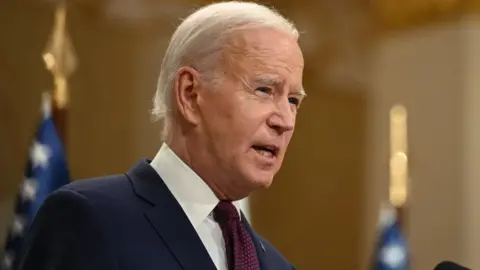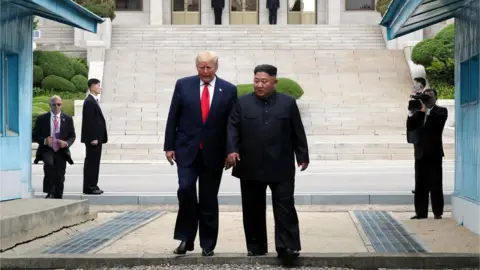Latest US-North Korea spat is high-risk moment for Biden

 Getty Images
Getty ImagesNorth Korea hasn't been much of a foreign policy priority for Joe Biden's administration since he took office in January 2021, but recent escalating tensions on the Korean peninsula are moving it up the list.
Now, with the detention of a US soldier who crossed the border in the demilitarised zone (DMZ), the situation could be turning into a full-blown crisis, the type of which the Biden administration has been trying to avoid.
The incident comes on the day that a US nuclear missile submarine, the USS Kentucky, arrived in the South Korean port of Busan - a visible demonstration of US military strength that had angered the North Koreans.
The move was a US response to more than a hundred new North Korean missile tests over the past few years that suggest the nation's nuclear-delivery technologies continue to advance - possibly putting the US mainland well within range of a North Korean strike. North Korea is also reportedly considering a new nuclear weapons test, which would be the first since a 140 kiloton blast in September 2017.
The motives behind the American soldier's decision to enter North Korea are unclear, although US officials have said that he was facing military disciplinary proceedings. What is apparent, however, is that his presence gives the North Koreans, and its volatile leader Kim Jong Un, a new bargaining chip to use when dealing with the US.
If the soldier is an unwilling detainee, Mr Biden could face growing pressure to arrange his release. And the North Koreans will certainly use his presence on their soil as a propaganda tool.
 Getty Images
Getty ImagesDuring Donald Trump's presidency, US-North Korea relations warmed somewhat after a heated start, as the American president made unprecedented overtures toward Mr Kim.
Mr Trump held a summit with the North Korean dictator in Singapore in June 2018, the first-ever meeting between leaders of the two nations. The following year, the two would hold a second summit, in Vietnam.
Later that year, Mr Trump visited the DMZ, where he was greeted by Mr Kim and crossed into North Korea - another first for a US president.
There was little to show for these efforts, however, besides a marginal cooling of rhetoric from Pyongyang.
Since assuming office, Mr Biden has declined to continue Mr Trump's diplomatic engagements, while attempting to strengthen US-South Korea ties as part of a diplomatic effort to create a regional counterweight to Chinese ambition.
Add to that a war in Ukraine and simmering conflicts in the Middle East, there have been a multitude of more pressing American concerns than the seemingly intractable, frozen-in-time conflict on the Korean Peninsula.
Now Mr Kim has a new means of forcing the US to pay attention to him - and meet his demands for respect and accommodation on the international stage. An American detained in North Korea is sure to generate international headlines.
If Mr Biden is unable to arrange his speedy resolution to the nascent crisis, it will be cited by his political opponents as an example of the current president's limited power on the international stage.
A more forceful reaction to the incident by Mr Biden, however, could lead to an escalation of an already tense situation at a time when US military resources are already stretched thin.
